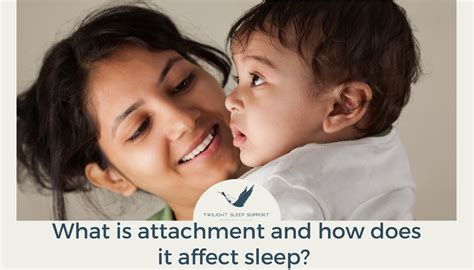How Does Attachment Affect Sleep
Ronan Farrow
Apr 04, 2025 · 3 min read

Table of Contents
How Does Attachment Affect Sleep?
Attachment theory, a cornerstone of developmental psychology, significantly impacts various aspects of our lives, and sleep is no exception. Our early childhood experiences with caregivers shape our attachment styles, which, in turn, influence our adult relationships and emotional regulation – both crucial factors in determining sleep quality.
Understanding Attachment Styles
Before delving into the impact on sleep, let's briefly review the main attachment styles:
-
Secure Attachment: Individuals with secure attachment had consistent, responsive caregivers during childhood. They feel comfortable with intimacy and independence, possess strong emotional regulation skills, and generally experience healthy relationships.
-
Anxious-Preoccupied Attachment: Characterized by a deep fear of abandonment, individuals with this attachment style crave closeness but often worry about rejection. This anxiety can significantly disrupt sleep.
-
Dismissive-Avoidant Attachment: These individuals tend to suppress their emotions and avoid intimacy. They often prioritize independence to a degree that hinders the development of close relationships. While seemingly independent, this avoidance can also manifest as sleep disturbances.
-
Fearful-Avoidant Attachment (Disorganized): This style is the most complex, stemming from inconsistent and often traumatic early childhood experiences. It combines the anxiety of the preoccupied style with the avoidance of the dismissive style, leading to significant emotional dysregulation and profound sleep issues.
The Link Between Attachment and Sleep Quality
The connection between attachment style and sleep isn't direct; it's mediated by several factors:
1. Emotional Regulation:
Securely attached individuals typically have better emotional regulation skills. They can manage stress and anxiety more effectively, leading to a more relaxed state conducive to sleep.
Insecurely attached individuals, particularly those with anxious or fearful-avoidant styles, often struggle with emotional regulation. Unresolved anxieties, fears of abandonment, or suppressed emotions can keep them awake at night, leading to insomnia or poor sleep quality. They might experience racing thoughts, nightmares, or difficulty relaxing.
2. Relationship Dynamics:
Sleep disruptions are often linked to relationship problems. For insecurely attached individuals, relationship anxieties – real or perceived – can significantly impair their sleep. Arguments, unresolved conflicts, or feelings of loneliness can fuel negative thoughts and rumination, hindering their ability to fall asleep and stay asleep.
3. Stress and Anxiety:
Attachment insecurity is often associated with heightened stress and anxiety levels. Chronic stress and anxiety are well-known culprits in sleep disturbances. The body's stress response, triggered by these negative emotions, interferes with the sleep-wake cycle. This leads to symptoms like difficulty falling asleep, frequent awakenings, and early morning awakenings.
4. Mental Health:
Insecure attachment styles are correlated with a higher risk of developing various mental health conditions, including anxiety disorders, depression, and PTSD. These conditions frequently manifest as sleep problems, further highlighting the interconnectedness of attachment, mental health, and sleep.
Improving Sleep for Those with Insecure Attachment
Addressing sleep issues in the context of attachment requires a multi-faceted approach:
-
Therapy: Therapy, particularly attachment-based therapy, can help individuals understand and process their past experiences, develop healthier coping mechanisms, and improve their emotional regulation skills.
-
Mindfulness and Relaxation Techniques: Practices like meditation, deep breathing exercises, and progressive muscle relaxation can help reduce anxiety and promote relaxation before bedtime.
-
Lifestyle Changes: Maintaining a regular sleep schedule, creating a relaxing bedtime routine, and ensuring adequate physical activity can significantly improve sleep quality.
-
Addressing Relationship Issues: Working on improving communication and conflict resolution skills within relationships can alleviate relationship-related anxieties that disrupt sleep.
Addressing insecure attachment is a journey, not a destination. By understanding the interplay between attachment, emotional regulation, and sleep, individuals can take proactive steps to improve their sleep quality and overall well-being. If sleep disturbances are severe or persistent, consulting a healthcare professional is crucial.
Featured Posts
Also read the following articles
| Article Title | Date |
|---|---|
| How Does The Honda Cr V Awd Work | Apr 04, 2025 |
| How Do I Become A Boxing Referee | Apr 04, 2025 |
| How Enzymes Work Worksheet | Apr 04, 2025 |
| How Do I Know When My Caspa Application Is Verified | Apr 04, 2025 |
| How Do You Put Ashes In A Necklace | Apr 04, 2025 |
Latest Posts
-
How Long After Knee Replacement Can You Play Golf
Apr 05, 2025
-
How Long After Impressions To Get Dentures
Apr 05, 2025
-
How Long After Hydrafacial Can I Wear Makeup
Apr 05, 2025
-
How Long After Gum Graft Can I Exercise
Apr 05, 2025
-
How Long After Goat Loses Ligaments
Apr 05, 2025
Thank you for visiting our website which covers about How Does Attachment Affect Sleep . We hope the information provided has been useful to you. Feel free to contact us if you have any questions or need further assistance. See you next time and don't miss to bookmark.
